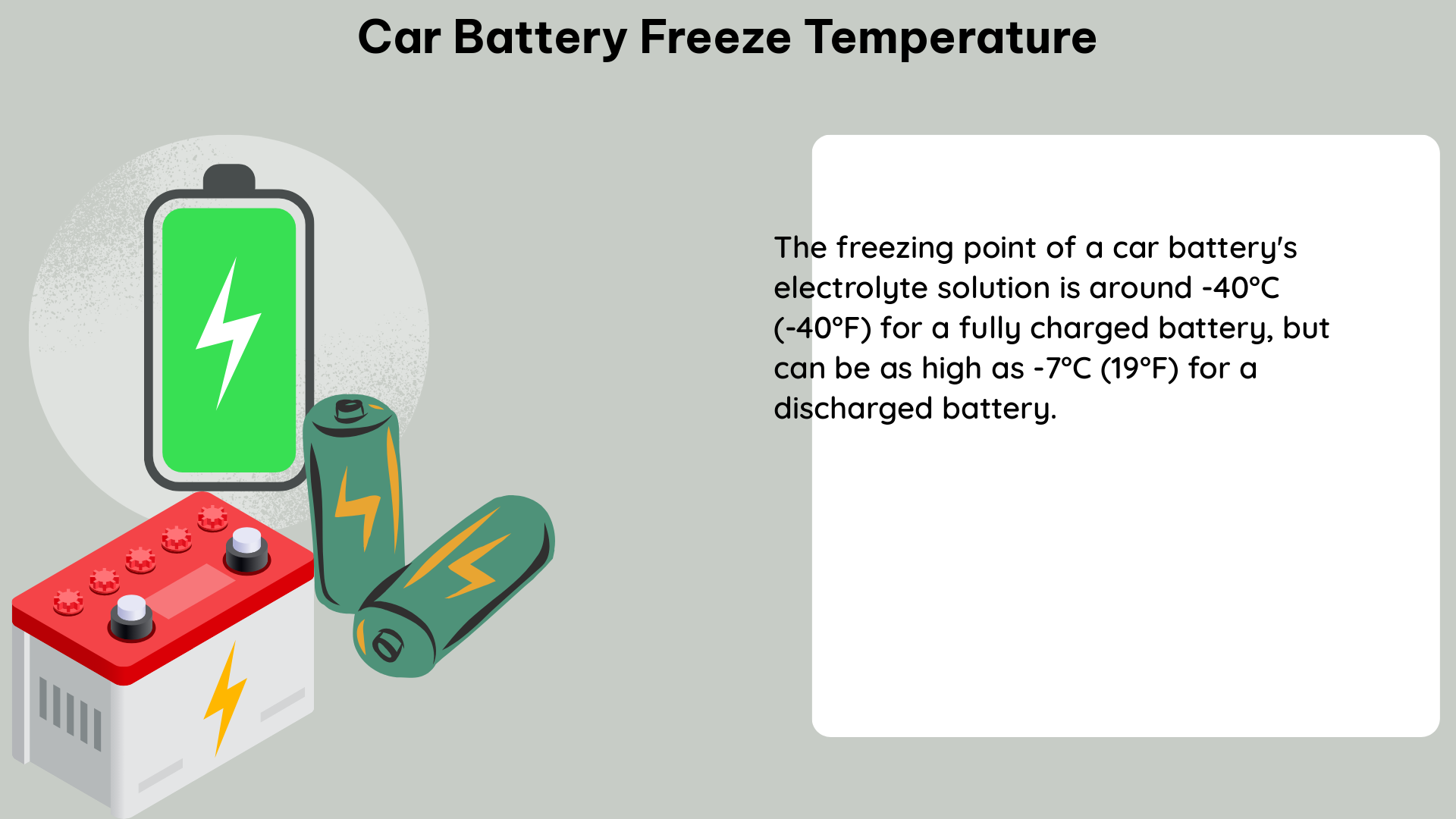Car batteries are essential components of modern vehicles, providing the necessary power to start the engine and support the electrical systems. However, when temperatures drop, these batteries can become susceptible to freezing, which can lead to a range of issues, from reduced performance to permanent damage. In this comprehensive guide, we’ll delve into the intricacies of car battery freeze temperature, equipping you with the knowledge to keep your vehicle running smoothly even in the harshest of winter conditions.
Understanding the Freezing Point of Car Batteries
The freezing point of a car battery is primarily determined by the charge level of the battery. A fully charged battery can withstand temperatures as low as -76°F (-60°C) before the electrolyte inside begins to freeze. Conversely, a fully discharged battery can freeze at or around 32°F (0°C).
The reason for this difference lies in the composition of the electrolyte, which is a mixture of sulfuric acid and water. In a fully charged battery, the electrolyte has a lower water content, making it more resistant to freezing. However, as the battery discharges, the water content in the electrolyte increases, lowering the freezing point and making the battery more susceptible to the effects of cold temperatures.
The Impact of Freezing on Car Batteries

When the electrolyte inside a car battery freezes, it can have severe consequences for the battery’s performance and longevity. As the electrolyte expands during the freezing process, it can cause the battery casing to crack or rupture. This, in turn, can lead to a short circuit between the positive and negative plates, ultimately damaging the battery beyond repair.
Moreover, the chemical reactions that power the battery are also affected by cold temperatures. The electrolyte becomes more viscous, making it more difficult for the chemical reactions to occur. This results in a slower rate of ion movement through the electrolyte, which in turn discharges the battery at a slower rate. Additionally, the capacity of the battery is reduced in cold temperatures, making it more challenging to start the engine.
Factors Influencing Car Battery Freeze Temperature
Several factors can influence the freeze temperature of a car battery, including:
-
Battery Charge Level: As mentioned earlier, a fully charged battery is more resistant to freezing than a discharged one. The charge level of the battery can be measured using a voltmeter, with a fully charged battery typically reading between 12.6 and 12.8 volts.
-
Electrolyte Composition: The ratio of sulfuric acid to water in the electrolyte plays a crucial role in the battery’s freeze resistance. Batteries with a higher acid concentration have a lower freezing point.
-
Battery Age and Condition: Older batteries or those in poor condition may have a higher water content in the electrolyte, making them more susceptible to freezing.
-
Ambient Temperature: The surrounding air temperature is a significant factor in determining the battery’s freeze point. The colder the environment, the more likely the battery is to freeze.
-
Battery Insulation: Some car batteries come equipped with insulation or heating elements to help maintain the optimal operating temperature, even in extreme cold conditions.
Preventing and Addressing Frozen Car Batteries
To prolong the life of your car battery and prevent freezing, it’s essential to follow these best practices:
-
Keep the Battery Charged: Regularly check the charge level of your battery and ensure it is fully charged, especially before the winter season. This can be done using a voltmeter or a battery charger.
-
Clean and Maintain the Battery: Keep the battery terminals and connections clean and free of corrosion. This helps maintain a strong electrical connection and prevents the buildup of contaminants that can accelerate the freezing process.
-
Insulate the Battery: Consider installing a battery insulation blanket or housing to help retain the battery’s heat and prevent freezing in extreme cold conditions.
-
Avoid Rapid Charging or Discharging: Sudden changes in the battery’s charge level can stress the internal components and make the battery more susceptible to freezing.
-
Park in a Warm Location: If possible, park your vehicle in a garage or other sheltered area to protect the battery from direct exposure to the cold.
-
Use a Battery Warmer: Investing in a battery warmer or trickle charger can help maintain the battery’s temperature and prevent freezing, especially during extended periods of cold weather.
-
Monitor Battery Performance: Keep an eye on your battery’s performance, and if you notice any signs of reduced cranking power or difficulty starting the engine, have the battery tested and replaced if necessary.
By understanding the intricacies of car battery freeze temperature and implementing these preventive measures, you can ensure your vehicle’s battery remains in optimal condition, even in the harshest winter conditions.
Reference:
- Can a Car Battery Freeze?
- What Happened to a Car Battery in Cold Weather?
- Charging at High and Low Temperatures
- The Effects of Temperature on Lead-Acid Batteries
- How to Prevent a Car Battery from Freezing

The lambdageeks.com Core SME Team is a group of experienced subject matter experts from diverse scientific and technical fields including Physics, Chemistry, Technology,Electronics & Electrical Engineering, Automotive, Mechanical Engineering. Our team collaborates to create high-quality, well-researched articles on a wide range of science and technology topics for the lambdageeks.com website.
All Our Senior SME are having more than 7 Years of experience in the respective fields . They are either Working Industry Professionals or assocaited With different Universities. Refer Our Authors Page to get to know About our Core SMEs.